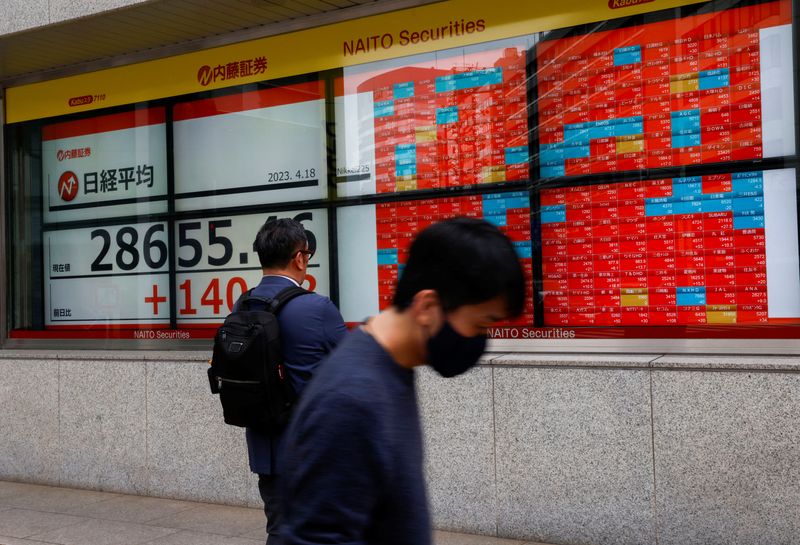By Ankur Banerjee
SINGAPORE (Reuters) -Corporate governance in Japan has suddenly become a cause celebre, rousing the world's third-largest stock market out of decades of lethargy and drawing in hordes of foreign investors.
Japan's stock market has long been seen by investors as a 'value trap' where companies focus on market share, hoard cash and care little about shareholder returns.
While there has long been talk of change, 2023 has seen some real evidence of a shift. One such example was when the board of 75-year old elevator maker Fujitec Co Ltd ousted its chairman last month, handing a huge victory to activist investors.
The Tokyo Stock Exchange (TSE) is forcing reform, too, threatening companies with underperforming stocks to demonstrate a better use of capital or face being delisted.
What has prompted investors globally to sit up and take notice is an endorsement from legendary billionaire investor Warren Buffett. Buffett's firm Berkshire Hathaway (NYSE:BRKa) Inc increased its stake in Japan's five largest trading houses and said he may invest more in the country.
"The worm has clearly turned in Japan," said Simon Edelsten, manager of UK-based Artemis's global select strategy fund. "For the Tokyo Stock Exchange to say that all companies that trade below book are going to have to do something about it is a massive change, a big step up."
The Nikkei Average, whose top companies include multinationals Fast Retailing and Sony (NYSE:SONY) Group, has persistently been undervalued, trading at close to book value, which is the value of a firm's assets.
A TSE analysis showed about half of the 1,800 companies on the exchange's prime section were trading below their book value in January, meaning the market is under-pricing the shares.
Investors say the push for better corporate governance has led companies to be more open to ideas to boost returns and stock prices. Buybacks for shares in the fiscal year ending in March hit a 16-year peak, according to calculations by Nikkei newspaper.
"Instead of discussing whether there should be a buyback, it’s a discussion of how big should the buyback be, often," said Jamie Halse, who manages an A$490 million Japan-focused fund at Platinum Asset Management in Sydney.
"Instead of a discussion about whether they need a woman on the board, it’s why don’t they have more women on the board," he said. "It’s definitely progressed. It’s been accelerating over the last five years and particularly for the last three."
Hisashi Arakawa, deputy head of Japanese equities for abrdn, said the management teams are more aware of capital efficiency and capital allocation. "We believe that they are increasingly willing to hear to investor views like us."
FLOCKING TO JAPAN
Foreign investors have also noted the change. Foreign investors purchased about 1.59 trillion yen ($11.82 billion) worth of Japanese shares last week, their biggest buying since at least 2018. The iShares MSCI Japan ETF, is up 8% in 2023 and saw inflows of $346 million in the week of April 5, its biggest weekly inflow in 18 months.
Artemis' Edelsten said he had been buying first-tier Japanese banks since the summer of 2022 and in the last quarter had built positions in two firms: printer Toppan Inc and machine maker Toyota Industries (OTC:TYIDF).
To be sure, not everyone is convinced. Steve Holt, head of international equity sales at investment bank RW Baird, said his clients were still wary of investing in Japan.
"Clients aren’t doing trips out there to discover huge value stories because they tried that for decades, it has been cheap for decades and cheap doesn't mean anything."
Still, those seeking to play undervalued stocks, i.e. the value proposition, have been rewarded. The MSCI Japan Value index is up 9% since August 2020 versus a 9% drop for the MSCI Japan growth index.
Seth Fischer, founder of Hong Kong-based Oasis Management whose activism led Fujitec to replace incumbent directors with ones nominated by the fund and then oust Fujitec's chairman, says shareholder votes are no longer overwhelmingly in favor of management, as was always the case in Japan.
Shares of the company has risen 17% since the board ousted its chairman in March and hit all-time peak of 3,570 yen on Wednesday.

"You have management that is put under pressure and pushed and pulled towards improving value," said Fischer, who has invested in Japan for 28 years.
"I think the value trap that was Japan is no longer."